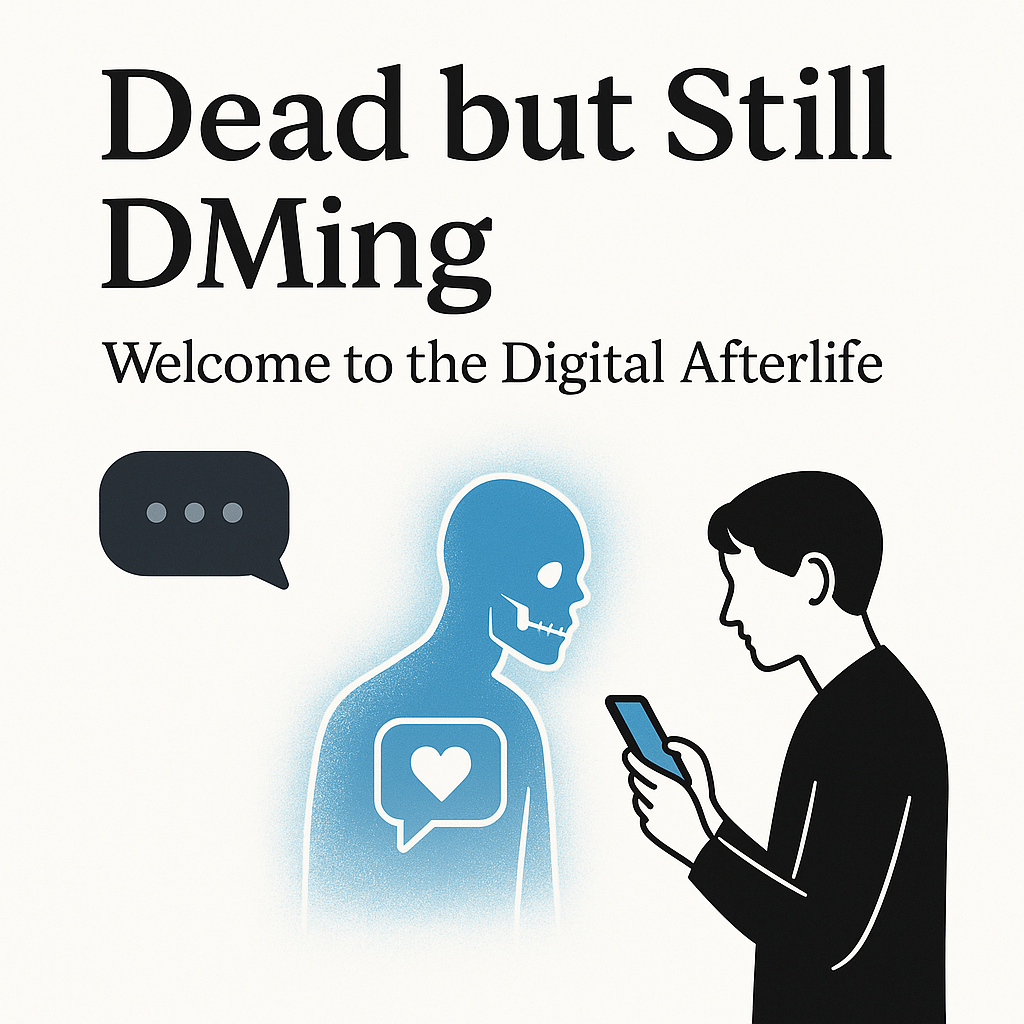Dead but Still DMing: Welcome to the Digital Afterlife
“Hi love, I miss you. Hope you’re eating well today. ❤️”
It was a sweet message. Comforting, even.
Except it was from my mom. And she passed away two years ago.
Welcome to 2025, where death doesn’t mean silence anymore. In this strange and emotional future, your loved ones can still text you, laugh with you, and share memories — all thanks to the rise of digital afterlife technologies.
Some find it beautiful. Others find it creepy.
Either way, it's happening. And it's reshaping how we mourn, remember, and connect.

🧬 The Rise of the “AI Ghost”
It started with legacy chatbots — tools that used archived messages, emails, and videos to create a conversational AI version of someone who had passed away. Now, in 2025, these have evolved into full-on AI replicas — complete with voice, personality, and even memory timelines.
Some of the biggest players in this space include:
- HereAfter AI – lets users record stories and memories to become part of a lifelike chatbot
- Re.Memory – turns voice notes and social media posts into an interactive voice clone
- DeepMind Tribute – still in closed beta, but rumored to include generative holograms based on LLMs
With the help of machine learning, natural language processing, deepfakes, and voice synthesis, these systems now offer something that once belonged to sci-fi movies: a digital version of you that lives on after you’re gone.
👻 “Talking” to the Dead — Is It Therapy or Denial?
For some, it’s a blessing.
“After my brother died, I couldn’t sleep. So I talked to his AI for hours. It knew our jokes. It sounded like him. It helped,” shares Dayo, a 29-year-old student in Abuja.
“My dad sends me morning messages — AI-generated, but still feels like him,” says Mabel, who trained a bot on her father’s texts and voicemails before his passing.
But for others, it’s unsettling — a line between remembrance and obsession that’s starting to blur.
Mental health experts are now debating:
Is this helping people grieve… or just stopping them from ever moving on?
⚰️ Your Data Is Immortal. Are You?
Even if you’ve never signed up for a “digital afterlife” app, you’re still creating one. Every time you:
- Text
- Post a photo
- Like a meme
- Use voice assistants
- Dictate a note
…you’re contributing to a data trail that could be used to recreate your personality.
And that’s not just for you. Parents are building AI memory banks for their children. Celebrities are pre-recording video messages for decades after their death. One billionaire even announced he’s investing in preserving his consciousness in a neural model “for future generations.”
Sound like Black Mirror? It is. But it’s also real life now.
🪦 Who Owns Your Afterlife?
Here’s the legal twist:
Who controls your digital self after you die?
- Can your family delete your AI bot?
- Can your replica be sold as a product or used in marketing?
- Can it speak for you in legal or financial matters?
In many countries, there are no clear laws. And this has already led to a few disturbing headlines:
“Woman sues startup for using deceased son’s voice in chatbot demo.”
“AI-generated likeness of late actor appears in ad campaign without family consent.”
As our digital selves outlive our physical ones, we’ll need to rewrite the rules of privacy, legacy, and consent.
🔮 The Future of Mourning?
Funerals are changing.
People are now requesting:
- A live message from their AI self
- A hologram giving a farewell speech
- Interactive memory walls for guests to ask the deceased questions
Some choose to be remembered in the metaverse, hosting ongoing birthday parties or “remembrance rooms” where friends can leave voice notes and flowers… virtually.
Others use digital wills that assign their AI selves to keep comforting loved ones or give guidance to children for years to come.
And yes — there's even a dating app prototype for AI widows and widowers to find love again… with the blessing of the deceased AI partner.
🤖 Death Isn’t the End — It’s Just Another App
We’ve come a long way from “Rest In Peace.” In 2025, it’s more like “Reply In Peace.”
Whether we like it or not, we’re entering a world where our memories, voices, and personalities will outlive us — as digital echoes that still have something to say.
Maybe the afterlife isn’t up in the clouds.
Maybe it’s in the Cloud.
Would you want your loved ones to talk to your AI version after you’re gone? Or does the thought freak you out?
Let’s talk about it in the comments 👇